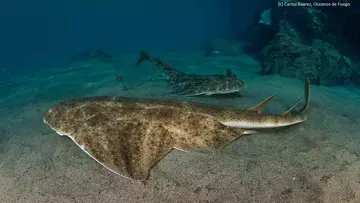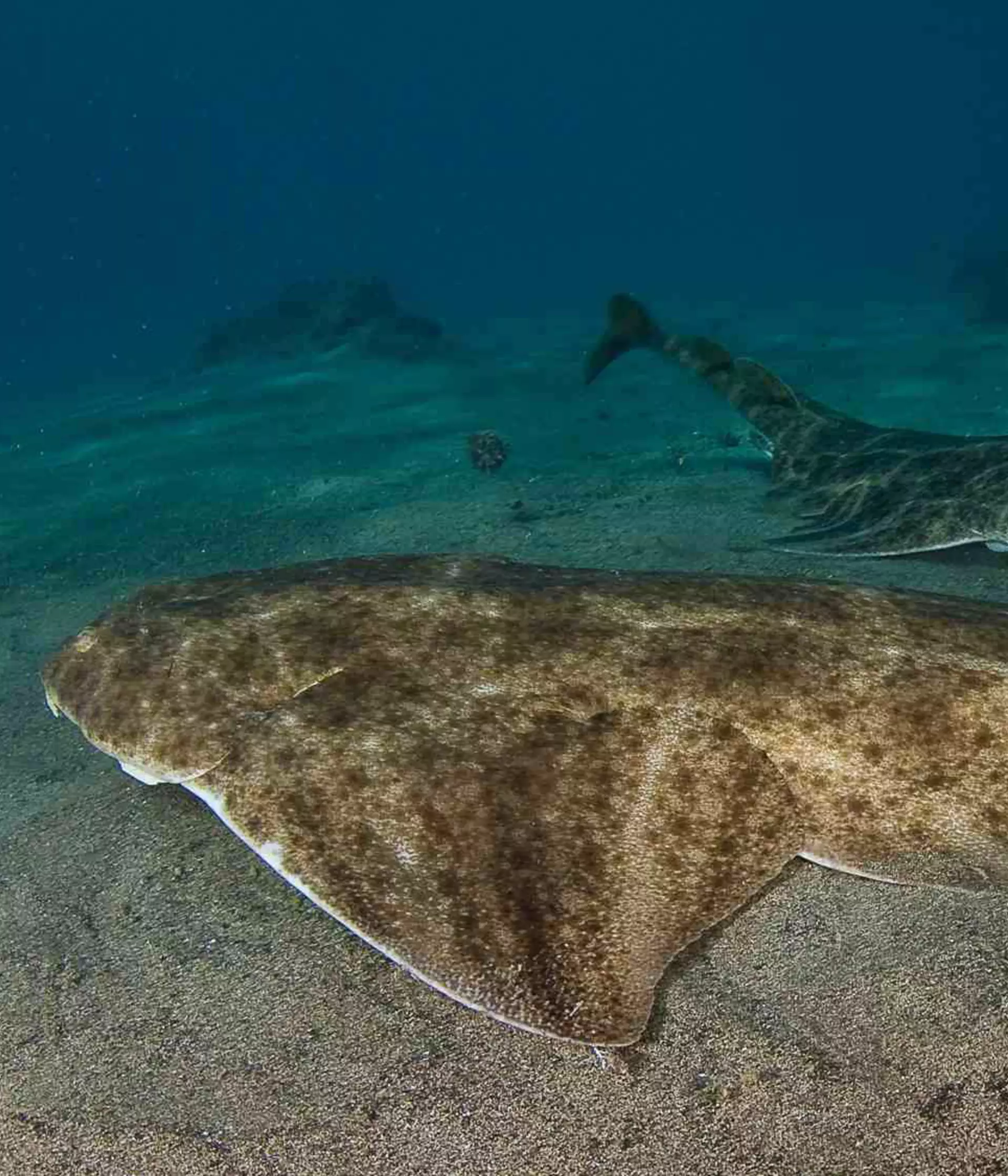
Angel sharks are being pushed to the brink of extinction, under threat from fishing and habitat degradation.
We have to act now to save them. With your support, we’re working at the cutting edge of conservation to protect angel sharks and create practical routes to their recovery.

What are angel sharks?
Angel sharks (Squatinidae) are large, flat-bodied sharks – they can grow up to 2.4m in length. They are slow growing, with low reproductive rates, and are usually found submerged in sandy habitats in coastal waters.
Due to their coastal location and biology, angel sharks are particularly vulnerable, and they have suffered steep declines throughout their historic range.
Three species of angel shark are found in the Eastern Atlantic and Mediterranean Sea, and are all Critically Endangered:
- Angelshark (Squatina squatina)
- Smoothback Angelshark (Squatina oculata)
- Sawback Angelshark (Squatina aculeata)
Information on Sawback Angelsharks and Smoothback Angelsharks is severely lacking, however the Canary Islands have been identified as a uniquely large stronghold for the Angelshark, as this species is still regularly sighted.
The Angel Shark Project
We’re working collaboratively with experts to protect angel sharks and bring them back from the brink through the Angel Shark Project (ASP).
From collecting ecological and population data to engaging with local communities, researchers and governments, we’re working to secure the future of Critically Endangered angel sharks.
The ASP is led by Universidad de Las Palmas de Gran Canaria (ULPGC), Leibniz Institute for the Analysis of Biodiversity Change (LIB) and the Zoological Society of London (ZSL) with further partners and collaborators across the range. We currently work in:
Angel Shark Conservation Network
The Angel Shark Conservation Network (ASCN) was established in 2016 by the Angel Shark Project (ULPGC, LIB, ZSL), IUCN Shark Specialist Group, Shark Trust, and SUBMON to share information on angel shark conservation efforts, in particular across the range of Sawback Angelsharks (Squatina aculeata), Smoothback Angelsharks (Squatinidae oculate), and Angelsharks (Squatina squatina).
It has since become the mechanism for developing strategic angel shark conservation planning documents and providing updates on angel shark conservation and research in the East Atlantic and Mediterranean Sea.
The ASCN also coordinates International Angel Shark Day, on 26 June every year to raise awareness of the 23 species of angel shark, and share information about how globally, researchers and conservationists are safeguarding this unique but threatened shark family.
How you can help
We can’t protect angel sharks without your support. If you’re lucky enough to see an angel shark, report your sighting with the Angel Shark Project or Angel Shark Network.
Your sightings help us to understand species distribution and test hypotheses around angel shark ecology, movement, and seasonality. By working together, we can save animals that are close to extinction.
Regular updates
If you’d like to keep up-to-date with the angel shark conservation and research happening across the East Atlantic and Mediterranean Sea, sign up to receive our Angel Shark Conservation Network eBulletins.
Partners
Angel Shark Project
This project is kindly funded by:
- Shark Conservation Fund
- CanBio
- Oceanario de Lisboa
- WWF Netherlands
- Disney Conservation Fund
- Ocean Tracking Network
- Nature Networks Fund (Welsh Government)
- National Lottery Heritage Fund
- On the Edge Conservation
Lead partners - ULPGC, LIB & ZSL
Canary Islands:
- Lead partners - ULPGC, LIB & ZSL
Wales:
- Lead partners - Natural Resources Wales & ZSL
- Delivery partners - Bangor University, Blue Abacus, North Wales Wildlife Trust, Shark Trust, Swansea University, ULPGC, LIB
Greece:
- Lead partner – iSea
- Delivery partners - ULPGC, LIB, Shark Trust, ZSL
Libya:
- Lead partner - Marine Biology in Libya
- Delivery partners - iSea, ULPGC, ZFMK, ZSL
Angel Shark Conservation Network:
Lead Partners - ULPGC, LIB, ZSL, IUCN Shark Specialist Group, Shark Trust, Submon
